Un-Roboxed
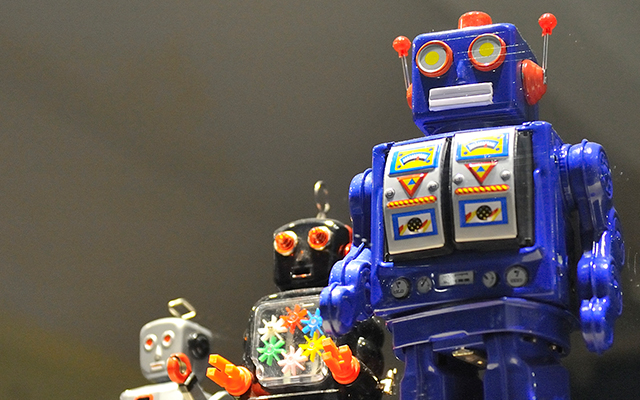
What’s the first thing that comes to your mind when you see the words “convention center?” Don’t think too much; just hold on to that very first thought that pops into your head. Did it relate to a conference or trade show?
Convention centers are built mainly for the purpose of conferences and trade shows, but not every venue has a completely booked schedule 100 percent of the time. And of course, more bookings mean more revenue.
There are endless types of events that convention centers can host as long as you have a little creativity, a little flexibility, and a little bit of time. “Unboxed” is an article to be published in the fall 2016 Leadership & Operations issue of FM magazine. The story covers three out-of-the-box events that convention centers have recently hosted and highlights some of the challenges that each venue had to face during the planning process.
The events in “Unboxed” are fairly large-scale functions, but not every calendar has that much space to fill. Fortunately, there are plenty of smaller-scale events that can squeeze perfectly between conferences.
FIRST is an organization that engages young people in a mentor-based science, engineering, and technology program. In short, they build robots! This group has hosted several events at venues all over the U.S., including the recent Dallas Regional Competition held at the SMG/Irving Convention Center in Texas.
“It was a great opportunity for the City of Irving, due to the type of event and the potential economic impact,” said Keri Berry, the center’s director of events. “The staff and volunteers of the Robotics Competition are so passionate about creating a memorable experience for the students and the schools.”
But this event was unlike any event that Berry had previously been a part of. The planning process took slightly less than a year, and although an event of this size has needs similar to those of trade shows (food and beverage, set-up, power, signage, etc.), it also has an added element of excitement.
“My favorite part of hosting the FIRST Robotics Competition was being able to watch the students work together on a common goal,” Berry said. “They have worked so hard to perfect their skill, even before arriving at the Irving Convention Center, which is a great example of teamwork and dedication.”
When it came to planning, the FIRST Robotics Competition only reiterated the core values that Berry already knew.
“With any event, not just a robotics competition, it is important to understand the client’s needs and goals,” Berry said. “Understanding these two things will assist in providing great customer service while making the event successful for the client and the hosting venue.”
To read more about out-of-the-box events hosted at convention centers, pick up your copy of FM magazine, hitting mailboxes this October. Don’t receive FM? Learn how to subscribe here and get your hands on the most tangible knowledge in the industry.
The International Convention Center Conference takes place Oct. 27-29 in Pasadena, California. Registration is open.
(Image: Rog01/Creative Commons)
Atlanta’s Fox Theatre Announces Expansion
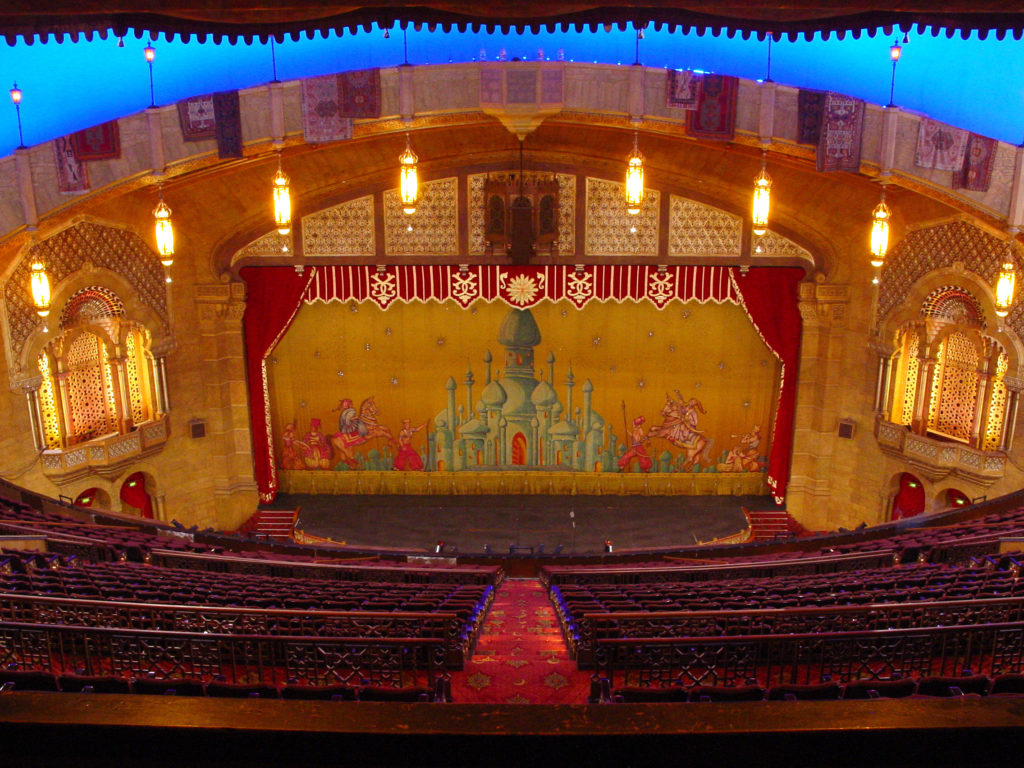
The world-renowned Fox Theatre in Atlanta, Georgia, plans to renovate 10,000 square feet of premier event space by converting a previous jazz club on the venue’s northwest corner into a premium guest lounge. It is set to open in late 2017.
“We saw an opportunity to enhance our offerings and create the most memorable experience possible for our guests,” said Fox Theatre President and CEO Allan C. Vella in a statement. “Atlanta’s entertainment landscape is ever-changing, and we are in a unique position to further the Fox’s physical and cultural footprint with this exciting addition.”
Guests in the exclusive event space will experience enhanced food and beverage service, two rooftop bars, private restrooms, concierge guest services, and parking. The Moroccan-style lounge will be members-only with general admission ticketing upgrade options. Details about membership and ticket upgrades will be available starting in January 2017.
“This is an undertaking we have not taken lightly,” said Fox Theatre Vice President and COO Adina Erwin, CFE, in a statement. “We found a great partnership with Lord Aeck Sargent, a local architectural firm specializing in conservation and preservation of historic venues. We are taking every precaution to keep adjustments minimal and have every confidence that their vision and experience will allow us to create an innovative space that is loyal to the legacy of the Fox Theatre.”
(Image: Fox Theatre/Sara Foltz)
Members in the News: Billy Langenstein
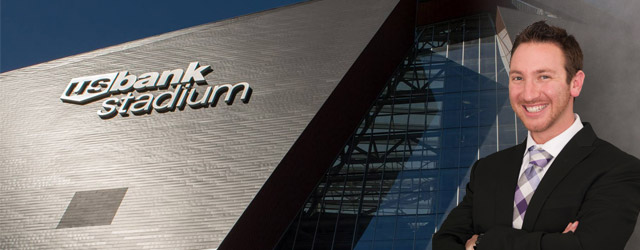
We like to highlight it whenever an IAVM member is featured in a news story or an article. The latest is Billy Langenstein, director of events services for U.S. Bank Stadium in Minneapolis, who Athletic Business magazine will publish a profile of in its upcoming October issue.
“On Vikings’ gamedays, he’s ultimately responsible for everything from transportation and emergency response to the actions of thousands of security and guest-services personnel,” the magazine wrote. “AB senior editor Paul Steinbach caught up with Langenstein the morning after the Vikings had played their second home preseason game in four days.”
Congratulations Billy! To read more, please visit Athletic Business for the full story. And if you’ve made the news recently, please send it to me at editor@iavm.org. Thank you.
(Image: Athletic Business)
Rod Laver Arena Redevelopment Designs Revealed
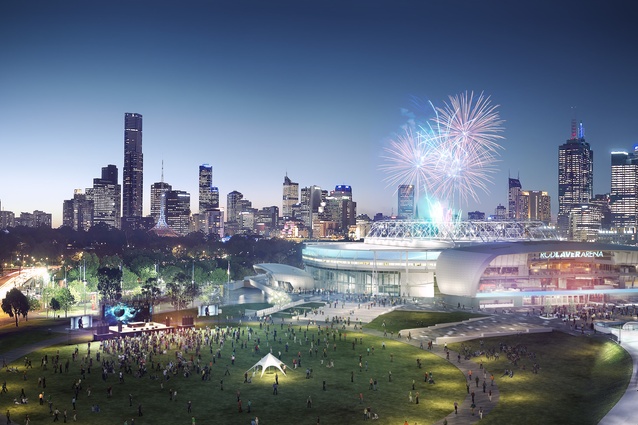
Melbourne, Australia’s Rod Laver Arena is set to undergo a redevelopment that will include four “pods” (also known as annexes) and upgrades to food and beverage stations and restrooms. The facade will be re-skinned, and disability access will be increased. All of this will happen as the venue stays open.
“It’s a bit like performing heart surgery while the patient’s still awake,” Patrick Ness, a principal director at Cox Architecture, who designed the redevelopment, told ArchitectureAU.com. “We’ve got this venue working and we have to do all this work around it.”
Ness said that each pod was designed depending on available space.
“What we’ve done, in a way, is create a series of mini town squares in each of those locations,” Ness said. “Then above that is the new architecture, which is in keeping with the original building but also unashamedly forward looking. [There are] new skins on the building, there’s lots of glass, very open structures, but they don’t compete with the original building.”
The redevelopment is set for completion by the end of 2019. Check out some images below of the design and visit ArchitectureAU.com for more on the story.
The Top 10 Most-Produced Plays for 2016-2017
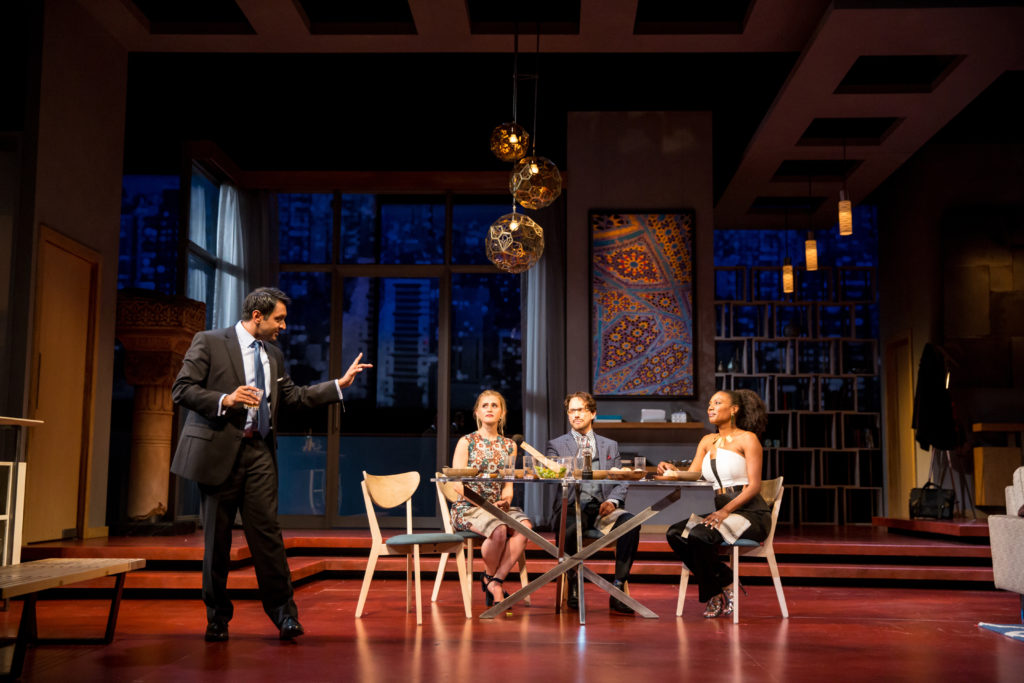
Disgraced performed at the Guthrie Theater.
Ah, the last quarter of the year. A time for reflection and list making, and one of my favorite lists is American Theatre‘s 10 most produced plays of the season. I suspect a few employees at performing art centers may be interested in this list, too.
“This year, we received a total of 411 season submissions from member theatres of Theatre Communications Group,” wrote Diep Tran, the magazine’s associate editor. “From there, we gathered all of the full-length productions scheduled between Sept. 1, 2016, and Aug. 31, 2017, running for at least a week’s worth of performances. Those productions numbered 1,946. To calculate our most-produced lists, it is our policy to exclude plays by Shakespeare and two perennial holiday shows (A Christmas Carol and The Santaland Diaries).”
The list actually includes 12 plays due to ties. Here’s the list, along with the number of productions scheduled:
Hand to God by Robert Askins (13)
Constellations by Nick Payne (10)
Disgraced by Ayad Akhtar (10)
Million Dollar Quartet by Floyd Mutrux and Colin Escott (10)
The Christians by Lucas Hnath (8)
Peter and the Starcatcher, adapted by Rick Elice from Dave Barry and Ridley Pearson (8)
The Legend of Georgia McBride by Matthew Lopez (7)
Sex With Strangers by Laura Eason (7)
Intimate Apparel by Lynn Nottage (6)
King Charles III by Mike Bartlett (6)
A Raisin in the Sun by Lorraine Hansberry (6)
Sister Act, with book by Bill and Cheri Steinkellner, music by Alan Menken, and lyrics by Glenn Slater (6)
Speaking from experience, the production of Disgraced that I saw at the Guthrie Theater in Minneapolis, Minnesota, during VenueConnect was excellent. It’s a powerful play that warrants a lengthy post-production discussion with friends. Try to see it if you can.
Registration for the 2017 Performing Arts Managers Conference will open soon. It takes place February 27 to March 1 in Chicago, a city renowned for its great theatre scene.
(Image: Dan Norman)
Do you want to receive a Front Row News weekly digest?
Categories
- Allied (856)
- Architecture (147)
- Arenas (744)
- Career (890)
- Convention Centers (889)
- Education (608)
- Events (1,528)
- Food & Beverage (193)
- Foundation (113)
- Guest Experience (1,482)
- Industry News (2,253)
- Leadership (1,872)
- Marketing (150)
- Membership (1,985)
- Music (212)
- Performing Arts Centers (453)
- Professional Development (398)
- Research (127)
- Safety & Security (425)
- Sports (763)
- Stadiums (607)
- Student (159)
- Technology (515)
- Ticketing (92)
- Touring (82)
- Trends (357)
- Uncategorized (771)
- Universities (216)
- Video (25)
- Young Professional (198)
Twitter Feed
- Twitter feed loading
Recent Posts
- GEODIS Park Selects Allied Universal As Its Preferred Event Services Provider
- Venuworks Appoints Marc Solis as Executive Director of the Fresno Convention and Entertainment Center
- Los Angeles Convention Center Diverts 8,000 Pounds of Wood Waste to Local Foundation Supporting Fire Victims
- Fort Worth Unveils Plans for Phase 2 of Convention Center Transformation
- San Diego Convention Center CEO Announces Retirement After a Decade of Leadership
Categories
- Allied
- Architecture
- Arenas
- Career
- Convention Centers
- Education
- Events
- Food & Beverage
- Foundation
- Guest Experience
- Industry News
- Leadership
- Marketing
- Membership
- Music
- Performing Arts Centers
- Professional Development
- Research
- Safety & Security
- Sports
- Stadiums
- Student
- Technology
- Ticketing
- Touring
- Trends
- Uncategorized
- Universities
- Video
- Young Professional
Archives
- February 2026
- January 2026
- December 2025
- November 2025
- October 2025
- September 2025
- August 2025
- July 2025
- June 2025
- May 2025
- April 2025
- March 2025
- February 2025
- January 2025
- December 2024
- November 2024
- October 2024
- September 2024
- August 2024
- July 2024
- June 2024
- May 2024
- April 2024
- March 2024
- February 2024
- January 2024
- December 2023
- November 2023
- October 2023
- September 2023
- August 2023
- July 2023
- June 2023
- May 2023
- April 2023
- March 2023
- February 2023
- January 2023
- December 2022
- November 2022
- October 2022
- September 2022
- August 2022
- July 2022
- June 2022
- May 2022
- April 2022
- March 2022
- February 2022
- January 2022
- December 2021
- November 2021
- October 2021
- September 2021
- August 2021
- July 2021
- June 2021
- May 2021
- April 2021
- March 2021
- February 2021
- January 2021
- December 2020
- November 2020
- October 2020
- September 2020
- August 2020
- July 2020
- June 2020
- May 2020
- April 2020
- March 2020
- February 2020
- January 2020
- December 2019
- November 2019
- October 2019
- September 2019
- August 2019
- July 2019
- June 2019
- May 2019
- April 2019
- March 2019
- February 2019
- January 2019
- December 2018
- November 2018
- October 2018
- September 2018
- August 2018
- July 2018
- June 2018
- May 2018
- April 2018
- March 2018
- February 2018
- January 2018
- December 2017
- November 2017
- October 2017
- September 2017
- August 2017
- July 2017
- June 2017
- May 2017
- April 2017
- March 2017
- February 2017
- January 2017
- December 2016
- November 2016
- October 2016
- September 2016
- August 2016
- July 2016
- June 2016
- May 2016
- April 2016
- March 2016
- February 2016
- January 2016
- December 2015
- November 2015
- October 2015
- September 2015
- August 2015
- July 2015
- June 2015
- May 2015
- April 2015
- March 2015
- February 2015
- January 2015
- December 2014
- November 2014
- October 2014
- September 2014
- August 2014
- July 2014
- June 2014
- May 2014
- April 2014
- March 2014
- February 2014
- January 2014
- December 2013
- November 2013
- October 2013
- September 2013
- August 2013
- July 2013
- June 2013
- May 2013
- April 2013
- March 2013
- February 2013
- January 2013
- May 2012
- March 2012
- December 2011
- November 2011
- October 2011
Recent Comments
- Frank Bradshaw, Ph.D., CVE on John Meyer, CVE, a Tireless Advocate of Certification for Venue Professionals, Has Died
- Neil Sulkes on Hilary Hartung, Friend to Many in Venue Marketing, Has Left Us
- Jason Parker, CVE on The Devastation of Hurricane Helene and How We Can Support One Another
- Larry Perkins on Touhey Testifies Against Speculative Ticketing Before Congressional Subcommittee
- Peter Secord on Major Players for Planned Elkhart Amphitheater Were in the Mix at VenueConnect
